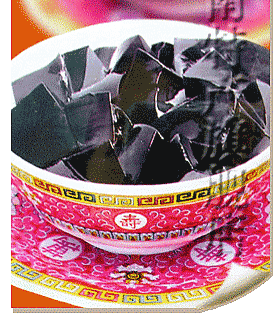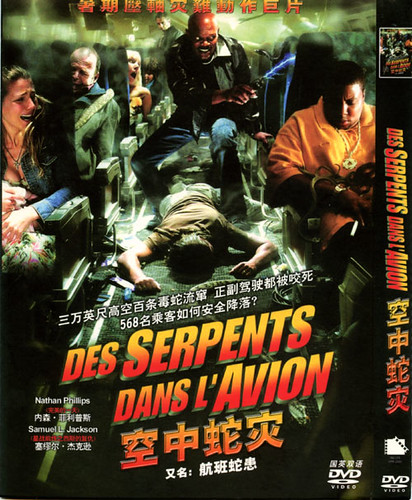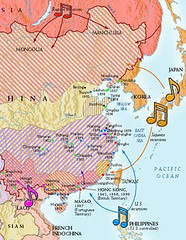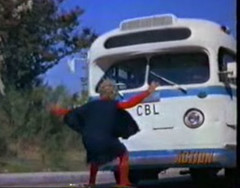29
Aug 2006The Hunt for Chinabounder
A while back I mentioned a blog called Sex in Shanghai in which a Western guy tells about all his exploits with Chinese women here in Shanghai. (That blog is still #1 on the “hottest blogs” list on the CBL, but it now seems to be inaccessible.) Since then, the Chinese have found out about the blog, and they are (understandably) pissed.
> From time to time, Chinabounder uses his own experiences as a springboard to make sweeping generalisations on, among other things, the sexual frustrations in Chinese marriages, the failings of Chinese men, and the overly tradition-bound upbringing of Chinese girls which makes them rebellious and sexually adventurous. Chinese netizens have routinely been posting venomous messages on his blog in response to his pop-social commentaries — and his occasional outpourings on the Cultural Revolution and Mao Zedong’s womanising ways.
> But last week, a professor of psychology at the prestigious Shanghai Academy of Social Sciences gave new direction to this hyperventilating when he called for an Internet manhunt “to find this foreign trash until we kick him out of China.” In a posting on his own blog, Prof. Zhang Jiehai said that Chinabounder, “an immoral foreigner”, had routinely used “obscene and filthy language to record how he used his status as a teacher to dally with Chinese women… At the same time, he did everything that he could to insult the Chinese government and men.”
> Giving sparse details about Chinabounder’s identity (he’s probably a 34-year-old Briton) Zhang called on “Chinese netizens and compatriots” to join this “Internet hunt for the immoral foreigner”. That message has found echo in numerous Chinese websites and blogs, which have resonated with calls for lynching Chinabounder.
Yikes! Real life consequences for licentious behavior in Shanghai? What is this world coming to?
Thanks to Megan for the tip.
Update 1: ESWN covered this story yesterday in greater detail. (Thanks to Phil, for bringing this to my attention. Phil also shared his thoughts on it, from a new media perspective.)
Update 2: Chinabounder has an imitator (sort of) that calls herself the “ChinaBoundress,” an “ABC Chick in Shanghai.”
Update 3: Sex and Shanghai a hoax? (Danwei.org)
28
Aug 2006What is Liangfen?
Liangfen (凉粉) is a kind of Chinese food which Wenlin translates as “bean jelly.” This is a pretty good translation; liangfen is made from beans and is about the consistency of jelly (although often a bit stiffer). In restaurants, liangfen can be served up like noodles and often looks something like this:
Doing a search for these liangfen images, I was reminded of a very different liangfen which became extremely popular last year:
(That would be 张靓颖 of “Super Voice Girls” fame. Her nickname is 凉粉. She also has a Chinese blog. [Correction: the fans of 张靓颖 are called liangfen, not 张靓颖 herself.])
Tonight I paid a visit to my advisor to discuss the coming semester’s classes and my master’s thesis. His wife brought out a big platter of watermelon slices. He insisted on making me a cup of iced coffee (which was quite good). His son gave me a Glico green tea-flavored snack to munch on. And then the special surprise came: 广东凉粉 (Guangdong liangfen). According to them it’s a traditional Guangdong summer snack, served chilled. You can’t find it in Shanghai, they said. It looked like this:
My only question before digging in was, “does it have animal blood in it?” (I would have eaten some anyway, but I just wanted to know.) They said no.
How did it taste? Well… it was basically “Chinese medicine flavored Jello-o.” Yum yum. Fortunately the flavor wasn’t too strong.
27
Aug 2006Chinese Style Snakes on a Plane
I watched the much “celebrated” Snakes on a Plane with John B and our wives last night. I picked up the DVD on the way over to his place. The DVD guy outside of the 好得 (AKA “All Days”) convenience store had it. Here’s what the cover looks like:
Thanks to Matt at No-Sword I knew what to expect in terms of the movie’s Chinese title, but I certainly didn’t expect the French title, or this camcorder edition’s laughtrack (yes, a French laughtrack). Really, though, when you’re expecting ridiculous, I guess it only adds to the experience.
The main and secondary titles on this cover confirm two of the mainland Chinese titles that Matt dug up:
– 空中蛇灾 — “Midair snake disaster”
– 航班蛇患 — “Snake woes on a flight”
24
Aug 2006The Commutants
The Shanghai Metro (subway) commuters are infamous for their “enthusiasm.” The subway philosophy of 先下后上 (let people off first, then board) is blasted repeatedly during rush hour by station attendants each and every day, but it always falls on deaf ears as the hoarde surges to board the subway cars the split second the doors open, forcing the passengers who wish to disembark to shove and claw their ways through the subway doorway battlefield. It really is insane, and it shocks most newcomers to Shanghai.
I once said to a Chinese friend that the rush hour commuters are “like animals.” That comparison didn’t sit too well. Although at rush hour they may be doing their best imitations of subhuman creatures, the commuters are, in fact, human beings deserving of respect (if only because they are human beings). Somehow Shanghai’s particular societal circumstances–including cultural factors and a massive population–contributes to this inexplicably barbaric commuter behavior.
I’ve been riding the subway a lot lately on my way to ChinesePod, and I am forced to ride both Line 2 and Line 1 (the Evil Line) every day during morning rush hour (oh, the horror!). I have quite a few thoughts I plan to share about these commuters with whom I rub elbows (among other things) on a regular basis.
But somehow the term “commuter” doesn’t seem entirely appropriate. Social conditions have transformed them into something beyond what the mere term “commuter” implies; their behavior has already mutated into something else. They are… Shanghai’s commutants*.
Fear them.
* OK, I’m aware that commutant is a mathematical term, but I think you know what I’m going for here.
22
Aug 2006Tone Deafness and Whispering Doesn't Stop Tones
I recently read a blog entry in which the author mused that life must be a living hell for tone deaf Chinese. If the language is tonal, and tones play a crucial role in differentiating words, then tone deaf Chinese can’t understand what other people are saying, right? Right?
Well, no. It’s not that simple. Singing and speaking a tonal language are not the same thing. However often you might hear people speak of “the music of the language,” the two are not the same. I’m lucky this is the case, because I’m a terrible singer.
A USA Today article explains:
> How can [a tone deaf Chinese person] tell the difference in speech between, say, [妈] and [马] with only their distinct tones to distinguish the meanings?
> Easily enough, it turns out. Mostly, he uses context and other language clues. Homonyms in Chinese (or English: “I’m a little hoarse”), rarely confuse a listener — when heard in context. But also, it’s easier to distinguish varying tones. Moreover, the tones we use in languages are coarse discriminators that even a disabled person can manage. To convey meaning differences, speech requires tone distinctions three to six times greater than melodies do for musical nuances.
(Pinyin News gets a little more analytical about it, if you’re interested.)
I was not surprised by this. I remember a while back when I first started studying Chinese, my dad posed this question to me: if Chinese is tonal, then can the Chinese understand each other when they whisper? This is actually a very good question. Whispers can’t carry tones. Trying “whispering to a melody.” You can’t.
This is because whispers lack what is called “fundamental frequency” (a physics term represented by f0), which is the basis for pitch. And that’s the aspect of normal spoken speech which carries tones.
So it would seem that my dad was dead on: it is physically impossible for whispers to carry tones. The thing is, you can whisper in Chinese, and it is understandable. But how does this work?
It turns out that when people whisper a tonal language such as Chinese, they naturally compensate for the lack of tones. How? According to one study:
> 1. the laryngeal sphincter mechanism is found to be a principal contributing physiological maneuver in the production of whisper, emphasizing the vertical rather than the horizontal component of the laryngeal source;
> 2. two special behavioral maneuvers are also used in whisper: male speakers tend to lengthen vocalic duration and female speakers tend to exaggerate the amplitude contours of Tone 3 and Tone 4;
> 3. these two special behavioral maneuvers and two temporal envelope parameters contribute to tone recognition in whisper, but the phonetic context is shown to be a distraction;
> 4. the environments of the target tones cause perceptual differneces, and the ranking of these environments in order of increasing degree of difficulty is: isolation, sentence-final, sentence-medial and sentence-final;
> 5. the ranking of the four tones in isolation, in order of increasing degree of perceptual difficulty is: Tone 3, Tone 4, Tone 1 and Tone 2.
> Source: Tones in Whispered Chinese: Articulatory Features and Perceptual Cues by Man Gao
Whew! OK, the basic idea is this: when people whisper, they naturally overcome the limitation of the medium by compensating in other ways. And they do it without even trying! I can even do it, and I’m pretty sure I never studied whispering tones. This is pretty cool.
So there you go, dad… it only took me about 6 years to find the answer to your question.
20
Aug 2006Chinaversary
Chinaversary n. pl. Chi·na·ni·ver·sa·ries
The annually recurring date of one’s initial arrival in China, especially when of great personal importance, as in the case of a “China expat.”
No, I can’t say I coined the term. I just learned this amusing word last week, which was quite timely because this month I had my 6 year Chinaversary.
Whoo-hoo!
18
Aug 2006Am I Married?
I haven’t mentioned my “girlfriend” in a long time. This is not only because I don’t like to talk about certain aspects of my private life here; it’s also because I’m not sure what to call her anymore. This is all due to the peculiar features of getting married in China.
You see, we are already legally married, but we have not yet had a “proper wedding.” To her and her family, that means a proper Chinese wedding banquet. To me and my family, that means a proper wedding in a Catholic church. All that will happen next year.
Furthermore, we are not living together. She still lives with her parents as before, and I live with my roommate Lenny. Our lives after becoming legally married remain almost exactly as they were when we were just “engaged.”
(So why did we get legally married so early? It’s largely to simplify the breaucratic headaches that arise from my nationality and her employer, and to save me from having to make another trip back to the States right before the wedding next year.)
I can call her my 老婆 in Chinese and this isn’t strange at all… Many Chinese couples here call each other 老婆 and 老公 long before they’re married (which really kind of annoys me for some reason). But calling her my wife–in English–feels wrong to me, because my whole life my idea of my “wife” has been the woman I spend the rest of my life with after we go through that sacred ceremony in church. And we haven’t done that yet.
In China, the wedding banquet has tremendous social significance for both families, but no legal standing. I know a Chinese couple who waited for years for the wedding banquet because they wanted to be legally married but couldn’t yet afford a nice reception. I also heard of a couple that had the wedding banquet but then split up and were never legally married in the first place. In the US, saying “I do” in a ceremony in front of a priest and other witnesses is a part of the legal process (in addition to the marriage registration).
So basically the feeling I get is that we’re taking that minute or so when the man and woman each say “I do” and the priest pronounces them husband and wife, and stretching it out to about a year. It’s a little strange, but I don’t think it’s all bad. Marriage is, after all, a big adjustment.
Update: Dan Washburn recently had a similar marriage experience.
16
Aug 2006Travel by Train: China vs. the USA
My friend Shelley used to live in Dongying, Shandong Province. He is now traveling in the States. Here is an excerpt of an e-mail I recently got from him:
> I arrived in LA this morning after 3 nights on a train and couple hours stopover in Chicago. I learned a few things about the differences between US and Chinese train travel. I should first mention that this trip closely mirrors a trip I took just last year in China. It also involved 3 nights on a train with a short stopover after the first night. However, my US train took me entirely across the country, from Washington D.C. to L.A. My Chinese train took me from Kashgar (far northwest) to Xi’an, which would be more like Seattle to Chicago in the US. But I think this had more to do with the speed of the train. Anyway…
> From my half-dozen Amtrak trips between Sacramento and San Jose, I knew that 1) there would be very few people on the train, and 2) there are electrical outlets and tables by most seats. From the info I had gathered from Amtrak’s website, I knew 3) private cabins would cost a bit more than a flight (around $350) but would allow me to travel in great comfort.
> Yeah, well, I was wrong about all that stuff. I must have been looking at the seat prices because my seat from D.C. to L.A. cost me $299. Private cabins cost $1,000 and were booked up “until September” according to one conductor. The train was also overbooked, and I witnessed the familiar sight of people scrambling to get on the train before everyone else. See, I had a ticket for a seat, but not a specific one. Some people got put in the lounge car until seats cleared up in the coach cabins. And finally, you guessed it, no tables or electrical outlets. There were 3, only 3, outlets in the lounge car within an unused snack counter area. I managed to get up early enough one morning to stake a claim on one and charge up my cell phone and iPod. And believe me, I protected my outlet from other power-starved travelers like a lion over its kill fends off circling hyenas.
> Now, a seat on a Chinese train for 3 nights would be an amazing feat of stamina and bladder control. I’ve never done that. The longest I went for was a 26-hour stint which I emerged from as if I had just climbed Everest. A seat on a US train for 3 nights is about a hundred times more comfortable because it’s 1) a bucket seat and not a bench, 2) much better climate controlled, 3) bathrooms are clean and well-stocked with necessities, and 4) the lounge car provides another place to hang out with wall-to-ceiling windows and TVs showing movies in the evening.
> That said, however, I wouldn’t recommend the train to anyone who wasn’t ready to spend a boatload of cash to make it more comfortable. While the seats were spacious, they didn’t fully recline and I never found a comfortable sleeping position. I mostly passed out from exhaustion. Several times I pondered the pros and cons of sleeping in the aisle, but the cons always won out.
> Also, the train is not merely kept well air-conditioned, it’s kept refrigerated. I actually love to crank the AC up, but I was absolutely freezing during the first night. I noticed that everyone else on the train took out thick blankets and heavy sweaters. They had obviously done this before. I shivered all the way to Chicago. During that stopover I bought a hooded sweatshirt, which wasn’t easy to find but I knew my health depended on it. And folks, I’m really not exaggerating. It was amazingly cold. Amtrak might be experimenting with cryogenics. Well ok, now I’m exaggerating a little.
> The food available wasn’t all that bad but keep in mind that my standards for western food are very low. It was definitely overpriced microwaveable stuff. But they really had a great variety of it. Still, this is no advantage over a Chinese train. If I were on a Chinese train the food would come to me on snack carts roaming the cars every half hour or so.
> In conclusion, I would have to say that Chinese trains are better. Really. Because for the same price as my US train seat, I could have bought a super nice cabin (soft-sleeper) on a Chinese train and traveled in great comfort … with an electrical outlet!
> I kept wondering why so many people were on the train at all. “Um, excuse me, doesn’t anyone here realize we could’ve flown for cheaper?” Apparently not.
Thanks to Shelley for letting me publish this.
14
Aug 2006"I'm your Papi" T-shirt Man
Dear Mr. “I’m your Papi” T-shirt Man,
You don’t know me, but I know you. Sure, we’ve never met, but you’re a “familiar stranger” to me. I pass you almost every day on my walk down Huangpi Nan Lu. I’m sure that I see certain people often on that walk and they just don’t stick in my mind, but you, sir, stick in my mind. Why? I think it’s because of your t-shirt.
In the searing Shanghai summer sun, you wear a black t-shirt every day. Furthermore, it has the words “I’m your Papi” boldly emblazoned on the front in big white letters. You are not a small man, and I can see your message from a long way off.
I just have to ask, though… Why “I’m your Papi” every day? I can tell you’re not poor; you’re always listening to your iPod, have nice shoes, and a shoulder bag that looks like it might contain a notebook PC. So clearly you can afford other clothes. I’ve caught you several times wearing a black “Batista unleashed” t-shirt, but I got the distinct feeling you were just wearing that so you could wash “I’m your Papi.”
At first I thought you had a thing for latinas (which I can certainly understand). If the “I’m your Papi” message was taken to heart even once, it might make the marathon worthwhile. But now I realize you’re just a fan of the WWE. And that’s fine…
…but “I’m your Papi” every day??
Related Classic Entry: Outfit Streaks
13
Aug 2006“吸可卡因”的快递员骑单车赛
一般美国人可能会觉得这样骑车是不可思议的,太危险了。中国人可能会觉得没什么特别的,不过速度的确挺快的。在中国大城市的道路上自行车好像达不到这种速度。
注意:这是bike messenger race(快递员骑单车比赛)。在YouTube上标题是“Bike Messengers Are on Crack”。意思是“快递员吸可卡因”。当然他们不是真的吸毒,只是一种俚语,形容某一种动作很疯狂。
12
Aug 2006Researchers of the Future
Last Thursday I met up with Dr. Lyn Jeffery, Research Director of the Institute of the Future and co-author of the excellent blog Virtual China. I invited her to stop by ChinesePod HQ to see what it was all about. Since what we’re doing over there is the “education of the future,” Dr. Jeffery was very interested in ChinesePod.
Accompanying Dr. Jeffery was Dr. Deborah Fallows, Senior Research Fellow at Pew Internet & American Life Project.
At lunch we chatted about internet usage, Chinese BBSes vs. American blogs, the China Blog List, our blogs, and other things. You know… the future. (The future is clearly very nerdy.)
At the time I opined that the Chinese probably prefer BBSes in general because blogging is very much an individual activity, putting one person in the spotlight, whereas BBSes offer a sense of collective security. Sure, BBSes can get shut down too, but no one person is likely to be targeted for action if the BBS members keep the scope of their comments within certain limits. Bloggers, on the other hand, are taking more of a risk. I admitted, though, that I’m no expert on Chinese BBSes, nor do I even read them often at all. I’m no Sam Flemming.
I later talked about this issue with a Chinese friend whose job in Shanghai is intimately related to the internet. He had a less political take on the issue. He felt the Chinese prefer BBSes because blogs are seen as private. BBSes are public forums, places where you can post something that can be read by thousands if you write something worth reading. Sure, blogs can be read by thousands too, but a lot of time and hard work is required to build up that kind of readership, and many just aren’t interested.
I consider myself very priveleged to be in a time and place where I can do work that appeals to me and just really stimulates me creatively and intellectually. It’s all part of the crazy exciting China feeling. Next week there will be a new editor to help me out with some of the day-to-day academic work at ChinesePod, so that will free me up for more creative and progressive work.
Frank Yu set up the meeting, and I thank him for that. It was good to see him when he visited from Beijing for ChinaJoy recently.
10
Aug 2006In-Lawed at The 88s
I have not read a blog entry as funny as “In-Lawed” in a long time. The author describes the various ways that his Chinese in-laws–under normal circumstances “generally reasonable and open people”–are gradually driving him insane during their visit to the US. Just two examples of these “small things”:
> – Dad, I got you the chicken McNuggets. I got you the little cup of ketchup for them. I got you a hot fudge sundae. I then watched in amazement as you dipped each of your ten McNuggets into your hot fudge sundae. I explained that the ketchup was for dipping, the sundae was desert. You slathered each McNugget in hot fudge and ice cream anyway. Dad, you rock.
> – Mom can’t be in the sun. Apparently she is a vampire and the sun melts vampires. Mom can’t be in the car. She gets car sick after 10 minutes. Mom doesn’t like to walk. It is too tiring. Mom doesn’t like to fly. It is too expensive. Mom wants to know where we are going today.
There are 14 more of these, and the above were not the funniest ones. Just read it.
I think part of the reason I am so amused by this story is that I know that in a year or two I will be in the exact same situation. I am pretty sure my in-laws will be a lot more “international” in their behavior, but I could be dead wrong. Hilarity could very well ensue for me as well.
P.S. The 88s is a great blog, and I should read it more often, but I’ve been so busy with work lately that I’ve been reading only about three blogs. So I must admit that I found this article through the Hao Hao Report.
09
Aug 2006Chinese Hip Hop Riddle
Micah sent me a link to this great riddle:
> 猜一个中文字:
(Guess the Chinese character:)
> “一个人在树上唱hip-hop”
(“a person in (on) a tree singing hip hop”)
> 什么字?
(What’s the character?)
I think the riddle is “great” because I doubt many Chinese people could get it, and this helps even the score just a tiny bit. (Not that I guessed it, though…)
Answer:
06
Aug 2006Chatting with Dr. Tim Xie

Dr. Tim Xie
Dr. Tim Xie (谢天蔚) of California State University Long Beach contacted me a while back. He was doing research for a paper called Blog, Wiki, Podcasting and Learning Chinese Language* (PDF; written mainly in Chinese). He did an e-mail interview with me about blogging in Chinese, part of which I later posted on my Chinese blog.
Anyway, recently Dr. Xie visited Shanghai. He stopped by ChinesePod to discuss some academic issues with Ken, and I also had a dinner with Dr. Xie during which we chatted about the state of academia in the PRC, thesis topics, and other fun things.
During our chat, he talked about what it was like, as a native of Shanghai, to make periodic visits after living abroad for twenty-odd years. Never mind the tremendous changes in the city; here’s an exchange he had with a cab driver:
> Driver: So you’re visiting Shanghai from abroad, huh?
> Dr. Xie: Why do you say that?
> Driver: Well, I know you don’t live here…
> Dr. Xie: How can you tell?
> Driver: Well, first, you speak flawless Shanghainese, but you gape at everything around you like a tourist. Second, you don’t dress like a local. And third, you don’t smell like a local. You use some kind of fancy perfumey stuff.
I found this conversation highly amusing.
* Note that in the paper Dr. Xie translates “podcast” not as 播客, which has enjoyed popularity in the PRC, possibly due to its cute similarity to 博客 (blog). Dr. Xie uses the term 网播 for “podcast.”
03
Aug 2006China Welcomes Musical Hegemony
Forgive me for the phrase “musical hegemony”–I’m not sure exactly what to call it. The fact is, foreigners in China routinely affronted with horrible pop music (and I’m talking more about the Western variety than the Chinese variety) desperately want to control the music of the Chinese locales they frequent. The good news is that it’s remarkably easy to do so, and you may even earn the eternal gratitude of a store manager by imposing your musical taste on her.
Brad used to be quite the musical hegemon. He would find a small bar he liked and make it his own. By “make it his own” I don’t just mean he would hang out there a lot and get to know the manager and staff, I also mean that he would make mix CDs for the bar, and the bar would happily play his musical selections (almost) all the time.
It doesn’t work only at bars, though. The last time I went for a haircut, I took a mix CD with me. The staff were thrilled to get it, and yanked their own CD mid-song so they could start playing my offering immediately. I amused myself by creating a ridiculous eclectic mix for the CD, a hodge-podge of classic pop (the decent stuff, i.e. not “Right Here Waiting” etc.) and semi-obscure stuff that most Chinese people wouldn’t know, but all with Chinese musical sensibilities in mind. Some selections:
– Out Hud – It’s for You
– Concrete Blonde – Joey
– Chromeo – Mercury Tears
– Van Morrison – Brown Eyed Girl
– Lisa Loeb – Stay (I think this one was a hit)
– Bryan Adams – Summer of ’69 (his only good song)
– Cyndi Lauper – Girls Just Want to Have Fun
– Sublime – Santeria
– Gin Blossoms – Hey Jealousy (sadly, I think this song was “too heavy”)
– John Frusciante – Murderers (you can’t not like this song)
– ABBA – Dancing Queen dance remix (this was my idea of a joke that I believe will be misinterpreted as “good music”)
I also took The Album Leaf’s “In a Safe Place” album to SPR Coffee, where the staff was happy to add it to their Winamp playlist. Oh yes, my tiny sphere of musical influence in Shanghai is growing (but I still cower before the might of, say, Brad and Aric).
So if you’re in China, start burning CDs and give musical hegemony a try with one of your local hangouts. You have nothing to lose, and quite possibly the prolonged sanity of many expat neighbors to gain.
01
Aug 2006The Scallop that was Chicken
Recently Mark visited Shanghai. One night having dinner at my place, there was a conversation that went something like this:
> Mark: This seafood is really good.
> John: Huh? What seafood?
> Mark: This seafood!
> John: That’s not seafood. That’s chicken.
> Mark: Really? Oh. In that case…
It wasn’t the first time that has happened. Sometimes chicken in China gets mistaken for scallop-like seafood. It’s not that the chicken tastes fishy, it’s that the texture is very much like scallop meat.
Why is this? Does anyone out there know? Should I be worried? What the hell am I really eating??
30
Jul 2006Greatest American Hero: ChinaMan?
No, I’m not talking about that Chinaman. I’m talking about ChinaMan!
So I grew up during the 80’s. I still like some of that cheesey stuff like ewoks and Adventure for Atari 2600. Not long ago I discovered that I could acquire all three seasons of the old TV show “The Greatest American Hero” through the magic of bittorrent. Acquire it I did, and I’ve been getting a real kick out of those old episodes (especially all the parts about fighting the commies). What really surprised me, though, was the logo on the main character’s suit.
When I first watched the show some twenty years ago, the logo meant nothing to me. Now when I look at it, it very distinctly looks like a stylized Chinese character 中 (meaning “middle” or “China”).
Of course the resemblance is most likely just coincidence, but when I showed the show to a Chinese friend, the question immediately arose: “why does he have a 中 on his chest?” I responded, “yeah, it does look like a 中, doesn’t it? But it’s not.” That got me a, “what are you talking about? It’s a 中!”
So is the Greatest American Hero actually ChinaMan? Or maybe the “aliens” that gave him the superpower suit in the first place were actually just the Chinese?
One more weird GAH/China connection: in Episode 1 of Season 2, the hero stops a bus marked “CBL.” CBL also happens to stand for the China Blog List, which, as luck would have it, also uses “中” as its logo. Coincidence??
OK, yes. That one is a coincidence.
But what’s the deal with the Greatest American Hero and 中?
28
Jul 2006Bokane.org is back!
For many, Brendan O’Kane is one of the most beloved China bloggers. It was distressing, then, to see his blog go for months unupdated. It looks like those days are over. The site is looking a bit plainer than it used to, and it’s not even blue and orange, but I think maybe that’s just temporary.
Brendan also writes an amazing Chinese blog.
26
Jul 2006Dumb Joke in Shanghainese
After hearing lately about how YouTube is now the undisputed king of online video, I did a search for 上海话 (Shanghai dialect) to see what it would turn up. A measly two videos! Here’s the only one kinda worth watching:
Here’s a translation of the joke, in Mandarin and in English:
> 冰箱里有两只蛋在聊天
Two eggs were chatting in the refrigerator
> 一只蛋对另外一只蛋说
One egg said to the other:
> 你看 这只蛋傻吧
“Look at that egg. Doesn’t he look dumb?
> 身上长毛了
He’s covered in hair!”
> 然后那只蛋就发火了
The third egg was furious
> 就敲了它一下
and hit the first egg.
> 说 傻瓜 猕猴桃也不认识
He said, “You idiot! Don’t you know a kiwi fruit when you see one?”
Har har.
24
Jul 2006Learning Korean in China
Since I don’t have classes over the summer, I figured it was a good time to start learning something new. I started learning Korean. To fit Korean into my hectic schedule, I hired a Korean foreign student from ECNU to come to my apartment and tutor me once a week. Why Korean? Well, I have several reasons:
1. Korean looks cool. I’ve always liked it. I like the way it sounds, too (more than, say, that overrated language French).
2. Korean (mostly) uses a phonetic writing system. The last two languages I tackled seriously have been Japanese and Chinese, and let me tell you, I don’t have time for any more of this “memorizing thousands of characters” crap.
3. It would be great to have some ability in all three of the official languages of East Asia. With English and Spanish, I’ve already got most of North America, South America, Australia, and Europe covered.
4. Outside of Korea itself, China is a pretty good place to study Korean (see below).
Anyway, I have had three classes so far, and I’ve learned a few things:












